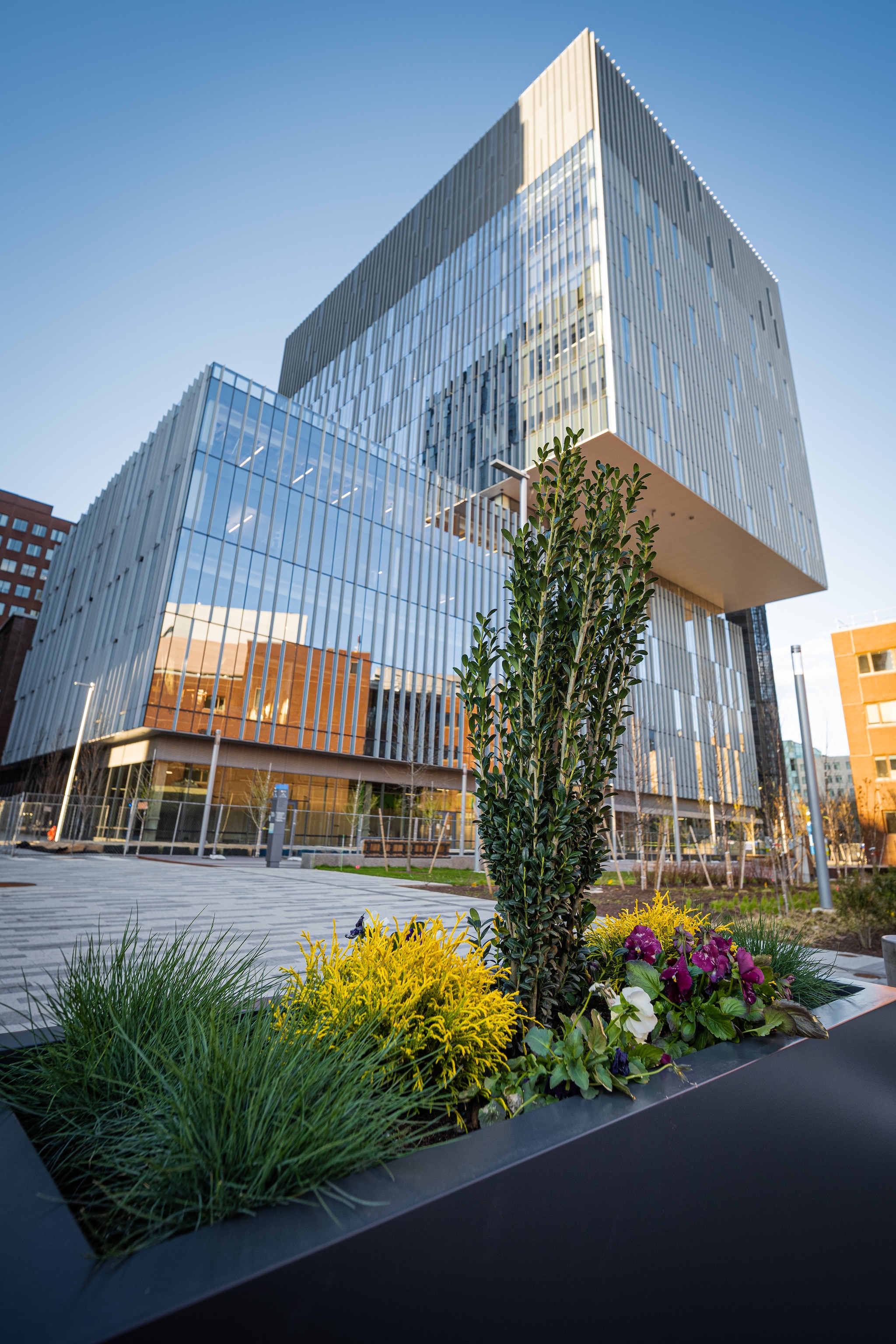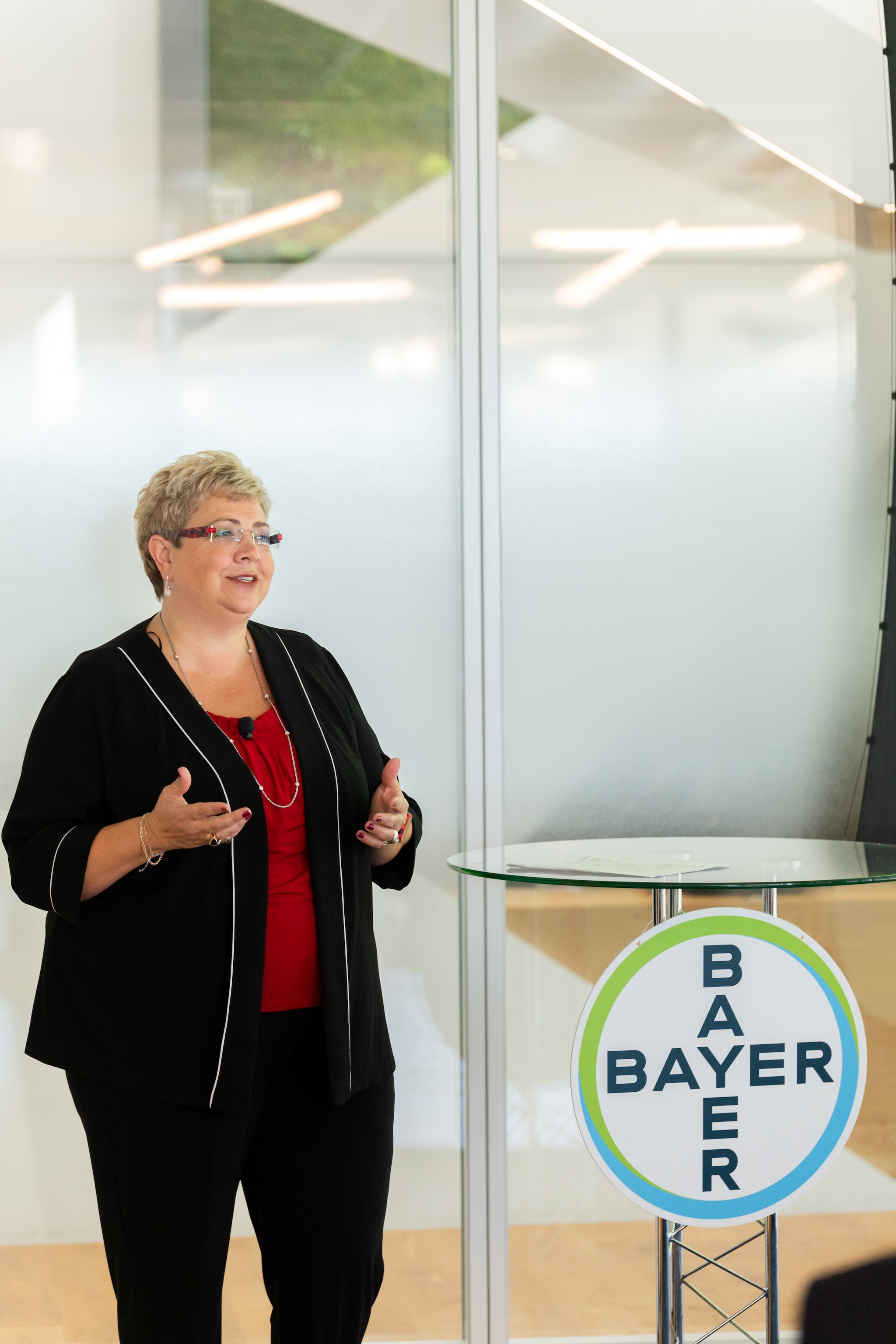- This Is Bayer
- Agriculture
- Consumer Health
- Pharmaceuticals
- Products
- Community
- News & Stories
- Careers
- This Is Bayer
- Agriculture
- Consumer Health
- Pharmaceuticals
- Products
- Community
- News & Stories
- Careers
New Bayer Research and Innovation Center in Boston Fuels Innovation and Partnership
Bayer recently welcomed its partners and media to its new Bayer Research and Innovation Center (BRIC) in Cambridge, MA. The state-of-the-art innovation facility is home to the company’s precision molecular oncology laboratory and reflects the investment Bayer is making to advance the future of oncology and science and generate breakthrough solutions to the world’s most complex challenges.
The event could not have been more timely, following President Biden’s speech – from Boston’s John F. Kennedy Presidential Library and Museum — touting the administration’s ambitious ‘moonshot’ effort to develop treatments and therapeutics for cancer, and ultimately cut cancer deaths in half the U.S. During these remarks, the President also named Dr. Renee Wegrzyn as the first director of the Advanced Research Projects Agency for Health, a new federal agency aimed at bold approaches that will drive biomedical innovation, specifically to fighting cancer. Dr. Wegrzyn is the vice president for Business development at Ginkgo Bioworks, the leading horizontal platform for cell programming and a Bayer partner.
Bayer executives from around the globe came together in Cambridge to express their excitement for Bayer’s future in Kendall Square, one of the country’s largest innovation epicenters. Werner Baumann, Bayer’s global chairman and CEO, shared insights on the company’s strengthened ties with the Cambridge scientific community.
“Bringing forth new solutions requires breakthrough innovation and collaboration,” said Baumann. “I have said before and will share again today…like so often in the history of health and agriculture, science will show the way.”
Partner with Boston’s Life Science Community
Across crop science, pharma, and consumer health, as the 60th largest company in the U.S., Bayer plays a significant role in improving the health of our planet and ultimately, the health of humanity. From sustainable farming to targeted oncology treatments, producing groundbreaking innovations to strengthen global health requires collaboration and partnership.
BRIC aims to strengthen collaboration between Bayer’s research and development teams, its wholly-owned subsidiaries and its many external partners including some of the Cambridge area’s brightest scientific minds. Bringing cutting-edge innovation to life is made possible through these collaborations with companies focused on agriculture and healthcare including Ginkgo Bioworks, the Broad Institute of MIT and Harvard, Mass General Hospital, Vividion, BlueRock, and many others. With over 20 hospitals, 200 medical research organizations, and 3,000 life sciences and biotech companies, the Cambridge area is at the forefront of scientific discovery and pharmaceutical R&D. The $140M investment in the 62,100 sq. foot research center mirrors Bayer’s dedication to enhancing the mission of science for a better life.

Innovation Across Industries
Across the pharmaceutical and agriculture industries, investing in the next wave of innovation looks quite different, but the focus on crafting healthier, better lives remains consistent.
Some of Bayer’s most influential divisional leaders were present at the event. Dr. Jackie Applegate, president of Bayer North America Crop Science, and Christine Roth, Bayer’s global head of oncology, shared insights on Bayer’s accelerated science in their respective fields. For example, by pioneering strategies to sustainably grow crops and reduce farmers’ reliance on nitrogen, Bayer is helping farmers feed the world. The focus on precision molecular oncology for the development of novel targeted cancer therapies provides patients with greater access to life-saving therapies.
“We are focused on providing solutions that help farmers produce more sustainable crops to meet demand for food, feed, fiber and fuel, while withstanding climate change, said Dr. Applegate. “Our solutions are meant to provide all Americans with more choices in self-care products to change current standards of care and ensure greater access to cutting-edge medicines for all who need them.”

Following each leaders’ remarks, Jürgen Eckhardt, Head of Leaps by Bayer, the company’s impact investment arm, moderated a panel with founders from companies Bayer has partnered with to discuss the risks and rewards of transformative biotechnology innovation. Panelists included Jak Knowles, co-founder, president and director of Affini-T, Nabiha Saklayen, CEO of Cellino Bio, Shehnaaz Suliman, CEO of ReCode Therapeutics, and Barry Canton, co-founder and the Chief Technical Officer, of Ginkgo Bioworks.
BRIC underscores Bayer commitment to innovation, which is evident through the rich investments Leaps by Bayer makes across health and agriculture partners.
“We now see that the disruptive ideas that result in biotech innovation are not just from big companies. About two-thirds of approved drugs have been originated by smaller biopharma companies, up from about one-third a decade ago,” said Eckhardt.
To help find solutions to the world’s biggest challenges, Bayer has invested 1.3 billion euros since 2015 and has committed to investing an additional 1.3 billion euros through 2024. To learn more about Leaps, visit our website.

As the world continues to face formidable challenges that impact our future, we remain committed to identifying solutions to help people live better. As Bayer continues to deliver on our commitments to farmers, patients, and consumers, BRIC plays a large role in advancing R&D that will make the biggest impact. To learn more about how Bayer is helping people live better, healthier lives, visit our Bayer U.S. website.